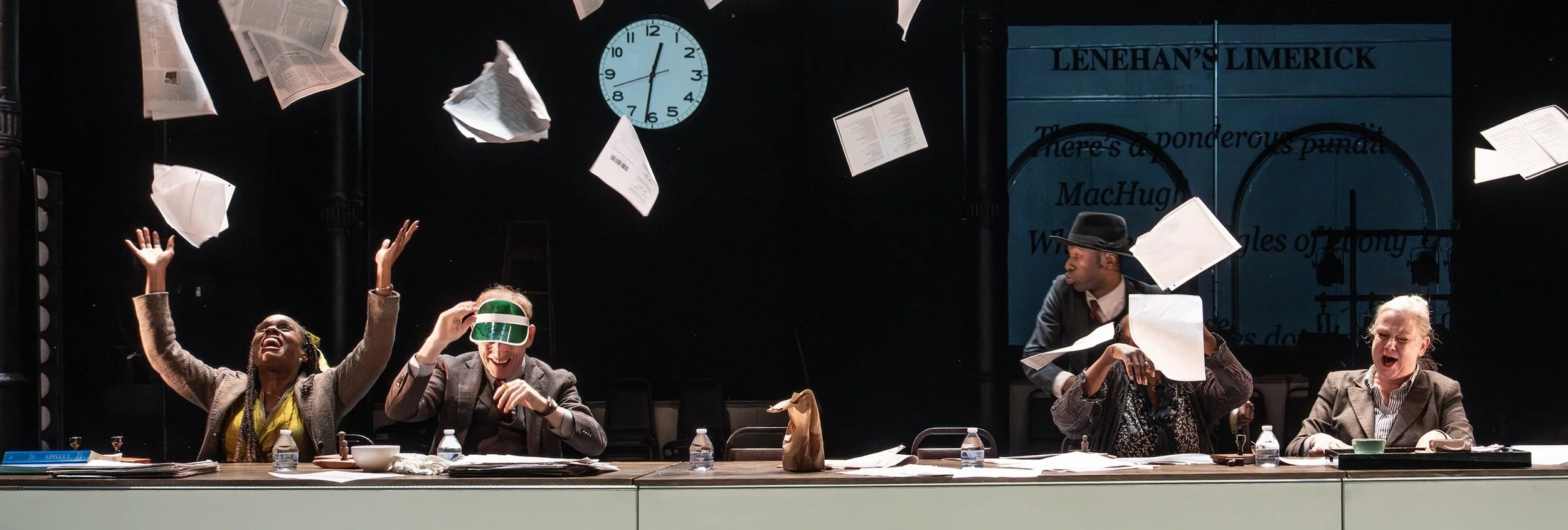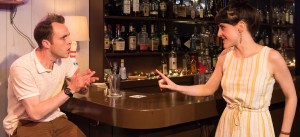Ben Beckley and Nate Weida’s In Corpo is a new sci-fi musical about human connection that will make some theatergoers smile and others wince. Directed by Jess Chayes, it draws on Franz Kafka’s unfinished novels The Castle and The Trial, Herman Melville’s short story “Bartleby the Scrivener,” and the artists’ own experiences navigating the corporate world. The piece grapples with corporate overreach, invasive technologies, and unresponsive bureaucracies to satirize how working in the corporate world can stymie one’s heart and soul. Its principals’ names, “K” and “Bartleby” (played by Austin Owens Kelly), are borrowed directly from Kafka (K. is the hero of The Castle; Josef K. of The Trial) and Melville’s 1853 short story.
Jane Anger
Poking fun at Shakespeare has been a fruitful pastime for more than a century. George Bernard Shaw enjoyed taking the Bard down a peg in his reviews of Victorian productions. In the 1950s Richard Armour wrote cheeky synopses of the plays in Twisted Tales from Shakespeare, and in 2015 the Broadway musical Something Rotten made fun of Shakespeare himself. Now actress and playwright Talene Monahon has done her bit to twist the dagger a few more times into the playwright with an often funny and splendidly acted Jane Anger.
Days of Drinking Games
Love has a hard road to travel to find itself, especially in this madcap world. It has never been easy for young adults to figure out the mating game, and in Half Moon Bay, a dark and witty new play by Dan Moyer, the lovers meet in the grungy bar of a bowling alley. The two-hander opens to Led Zeppelin and bright lights, then goes pitch-black as the Talking Heads blare in the darkness. The lights (by Mike Inwood) abruptly go full up to reveal Annie (Keilly McQuail) alone at the bar, where she meets the neurotic Gabe (Gabriel King), a gambling addict with too much time and money on his hands. The alcoholic Annie gives Gabe lessons on pickup lines. And so begins a dark comedy about the narcissistic, existentialist, and often self-destructive struggle young adults experience to find themselves.
Moyer’s intelligent yet poignant dialogue reflects what many go through at that period when a person realizes he or she is not a child anymore and is trying to play grownup, but doesn’t know how. Gabe asks, “You here with anyone else?” And Annie retorts smugly, “No I come here alone and bowl by myself, then I go home and cry when I lose.” Amid the humorous banter there is a serious undertone that mirrors the inner struggle of finding love in a hopeless place.
Annie realizes she’s an addict when she discovers she has genuine feelings for Gabe. Although both actors start out tensely over-animated in performance, as they live through what they are doing and build the emotional life of their characters, their desperation becomes compelling.
Reid Thompson’s set is so real it’s surreal, enhancing that unearthly feeling that alcohol and attraction can give. Pictures on the wall tell of past bowling championships; half-empty liquor bottles and dirty glasses whisper of other lost nights. The disarray of Annie’s apartment reflects the disarray of her life.
Choices by sound designer Janie Bullard and Thompson heighten the characters’ emotional state. The muted outside illumination that Inwood has artfully crafted for the Santa Cruz, Calif., setting is particularly effective, as is the way nighttime becomes daybreak as Annie switches from “party-ready” to “Get the hell out of here” mode after their evening together.
Thompson’s set is utilized fully by director Jess Chayes; the actors improvise and evolve in their experience together, and ultimately connect in this mad, mad world. Starting out quick-witted and terse, the evening ends poignantly still and emotionally moving. The play looks at broken children and reprimands society to offer more to them, underlining that young adults need guidance on how to love as well as maneuver through life.
In response to Annie’s story on bad pickup lines like “Your mouth is like a window to the tongue,” Gabe asks her, “It didn’t work, did it?” She sadly replies, “Of course it didn’t work. Very much.” Yet a good deal of the play is about what is not said; it helps that director Jess Chayes’s choice of music sets the proper tone.
Thankfully, Moyer offers hope in the end for the lovers. After much fear and reluctance Annie does open up and allows Gabe into her heart. There’s a possibility for them to find a true connection.
Lesser America’s production of Half Moon Bay runs through June 4 at the Cherry Lane Theatre (38 Commerce St.). Evening performances are at 8 p.m. Thursday through Sunday at 8 p.m.; there is an additional performance on Wednesday, May 18, at 8 p.m. For tickets, which are $19, call OvationTix at (866) 811-4111 or visit www.cherrylanetheatre.org/onstage/half-moon-bay.










